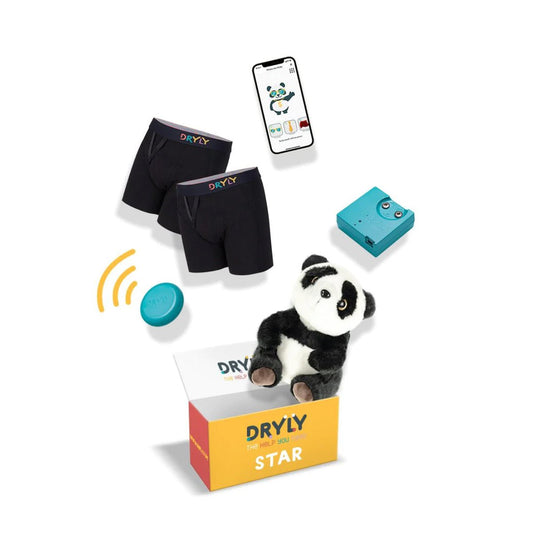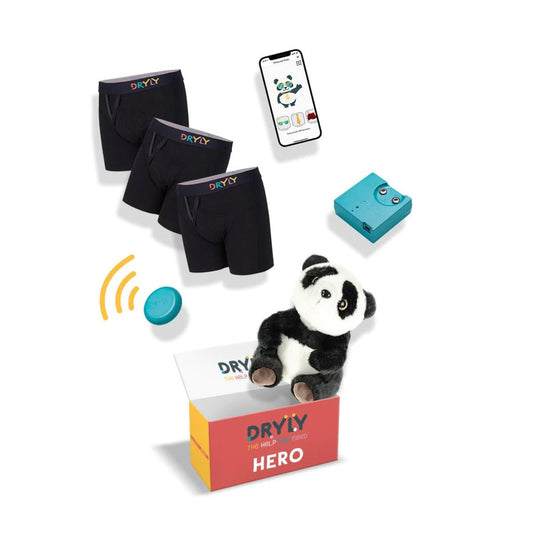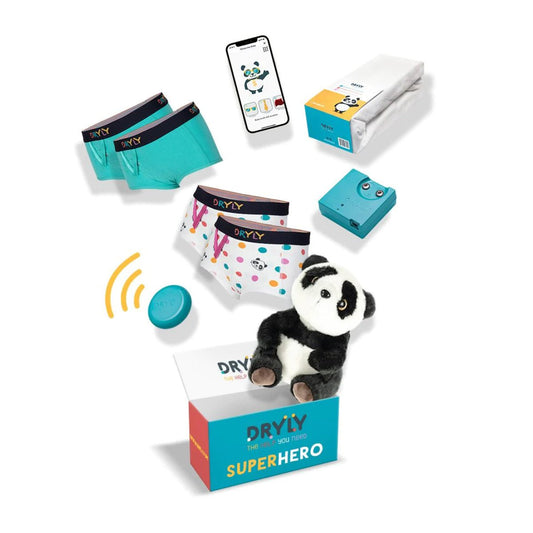Bedwetting is a difficult issue for many families, especially the child. Although some children eventually grow over it, the process can take a long time and involve a lot of uncertainty and embarrassment. In such situations, a tool such as the bedwetting alarm can provide an effective solution. But what is the right age to start using the bedwetting alarm? We regularly hear this question from parents who are considering supporting their child in potty training at night. In this blog, we look at what you can look for to determine the right timing to start the bedwetting alarm.
What is a bedwetting alarm?
Before we look at the ideal bedwetting age, we will briefly explain what a bedwetting alarm is. The bedwetting alarm is a device that wakes a child during the night as soon as he or she begins to urinate. The sensor is in the underwear, it detects the moisture coming into the pants at the first drop. In this way, the child learns to wake up when the bladder is full. The goal: to develop awareness and control over nighttime potty training.
Average age for nighttime potty training
Most children become daytime potty trained between 2 and 4 years old. Nighttime potty training often takes a lot longer. Many children are not completely dry at night until between 4 and 6 years old. This is normal and not yet an immediate cause for concern. The brain and bladder need to become attuned to each other, and this can take some time. Still, there are some children who suffer from this a bit longer, or children who have the motivation to work on nighttime toilet training earlier. In those cases, a bedwetting alarm can help.
What is the ideal bedwetting alarm age?
The ideal bedwetting alarm age is usually between 5 and 8 years old, depending on the child. Below are some signs that your child is ready for a bedwetting alarm:
- The child is fully potty trained during the day
- There is motivation to wake up dry
- Bedwetting happens structurally (more than 2 times per week)
- Other causes such as medical problems have been ruled out
A younger child of, say, 4 years old is often not yet cognitively developed enough to recognize signals from the brain to the bladder. With children older than 8, it is important to check if there are other underlying medical reasons, otherwise the bedwetting alarm may also be a good solution!
Why age is not the only thing that matters
Although the bedwetting alarm age is important, what matters most is the child's developmental stage. Some 5-year-old children may already respond well to the bedwetting alarm, while a 7-year-old child may not wake up at all during the night. Therefore, it is smart to look closely at your child's behavior and motivation. Is there motivation to solve the bedwetting problem? Is your child willing to try something on his or her own? Then there is a much better chance that the bedwetting alarm will actually have an effect.

How long does it take for the bedwetting alarm to take effect?
On average, a bedwetting alarm training takes 3 months. This can also be faster, but it can also take longer. It is important that parents supervise the process positively, are consistent and do not immediately give up when results have not yet been achieved. Because of the child-friendly and motivating elements with the Dryly Soaker Method, the average of a soaker training session is 6 - 8 weeks! If your child is still not showing results with a pee alarm after 3 months, it may be wise to contact a doctor or specialist.
Practical tips for parents
Choose the right time: start the bedwetting alarm in a quiet period, during stressful periods this can be very intensive for children (such as a move, Saint Nicholas or the new school year)
- Establish a routine: go through the same ritual together every night (this can be done very conveniently via the Dryly app)
- Reward effort, not just staying dry: Focus on trying and waking up, even when things go wrong from time to time!
- Make the child own the process: Let him/her set the alarm clock, and follow the routine so that your child is actively engaged in solving bedwetting.
At what age do you start a bedwetting alarm?
The ideal bedwetting alarm age is around 5 to 8 years old, when a child is motivated and there is recurrent bedwetting. Age is only one of the factors, also look especially at your child's cognitive and emotional development. By properly supervising and observing, you significantly increase the chances of a successful bedwetting training.
Still have questions or want to know more about our bedwetting alarm and how it can help your child? Then be sure to check out the Dryly website, or contact us so we can provide you further!




